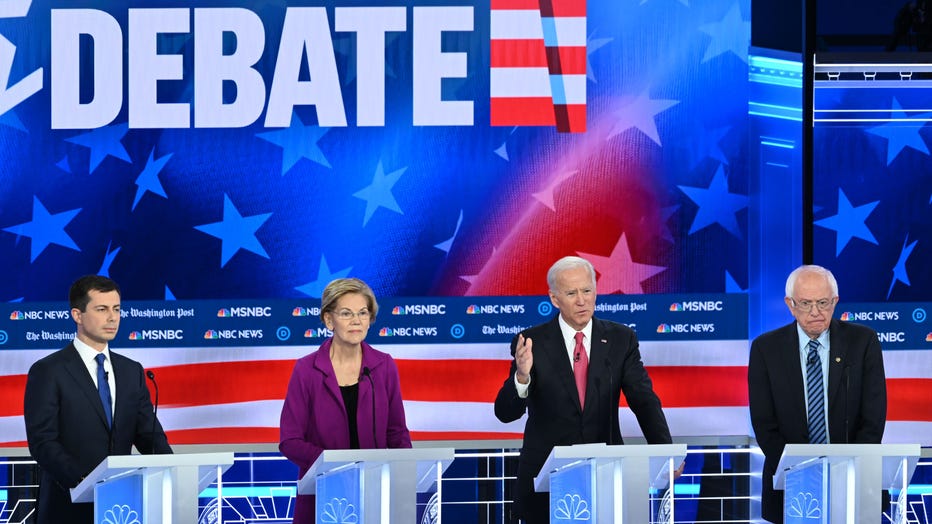7 Democrats to take stage in final presidential debate of 2019
LOS ANGELES - Seven presidential contenders will take the debate stage Thursday for a sixth and final time in 2019, only a day after House Democrats voted to impeach President Donald Trump.
The debate will be the smallest stage yet, down from 20 candidates six months ago, and be televised in the heavily Democratic California. It will begin at 8 p.m. ET at Loyola Marymount University in Los Angeles.
Participants include former Vice President Joe Biden, Vermont Sen. Bernie Sanders, Massachusetts Sen. Elizabeth Warren and South Bend, Indiana, Mayor Pete Buttigieg, who are clustered at the top of the field, followed by Minnesota Sen. Amy Klobuchar, businessman Andrew Yang and billionaire philanthropist Tom Steyer.

Democratic presidential hopefuls (L-R) South Bend, Indiana, Mayor Pete Buttigieg, Massachusetts Sen. Elizabeth Warren, former Vice President Joe Biden and Vermont Sen. Bernie Sanders are pictured during the fifth Democratic primary debate on Nov. 20,
The Democratic National Committee raised the fundraising and polling thresholds for the sixth debate, narrowing the field.
Missing from the lineup will be former New York City Mayor Michael Bloomberg, a billionaire who is unable to qualify for the contests because he is not accepting campaign donations. But even if he's not on the podium, Bloomberg has been felt in the state: He's running a deluge of TV advertising in California to introduce himself to voters who probably know little, if anything, about him.
After a politically-divided House voted to impeach the Republican president, Thursday’s debate will underscore the concern for Democratic voters: Who can beat Trump in November?
RELATED: House votes to impeach Trump for abuse of power, obstruction of Congress
There will be a notable lack of diversity onstage compared to earlier debates. For the first time this cycle, the debate won't feature a black or Latino candidate.
Biden adviser Symone Sanders said to expect another robust exchange on health care.
“This is an issue that is not going away and for good reason, because it is an issue that in 2018 Democrats ran on and won," she said.
Jess O'Connell, a senior adviser with Buttigieg's campaign, said the candidate will “be fully prepared to have an open and honest conversation about where there are contrast between us and the other candidates. This is a really important time to start to do that. Voters need time to understand the distinctions between these candidates.”
The key issues: health care and higher education.
The unsettled race has seen surges at various points by Biden, Warren, Sanders and Buttigieg, though it's become defined by that cluster of shifting leaders, with others struggling for momentum. California Sen. Kamala Harris, once seen as among the top tier of candidates, ended her campaign this month, citing a lack of money.
“I’ve taken stock and looked at this from every angle, and over the last few days have come to one of the hardest decisions of my life," she wrote in a note to supporters. “My campaign for president simply doesn’t have the financial resources we need to continue.”
Warren has become more aggressive, especially toward Buttigieg, as she tries to recover from shifting explanations of how she’d pay for “Medicare for All” without raising taxes.
In a replay of 2016, the shifting race for the Democratic nomination has showcased the rift between the party's liberal wing, represented in Sanders and Warren, and candidates parked in or near the political center, including Biden, Buttigieg and Bloomberg.
Two of the other candidates who didn’t make the stage will still make their presence felt for debate watchers with ads reminding viewers they’re still in the race.
New Jersey Sen. Cory Booker and former Housing Secretary Julián Castro are airing television ads targeted to primary voters during the debate. Booker’s is his first television ad, and in it he says even though he’s not on the debate stage, “I’m going to win this election anyway.” It’s airing as part of a $500,000 campaign, running in Iowa, New Hampshire, Nevada and South Carolina, as well as New York, Washington, D.C., and Los Angeles. A pro-Booker super PAC is also going up with an ad in Iowa highlighting positive reviews of Booker’s past debate performances.
Meanwhile, Castro is running an ad, in Iowa, in which he argues the state should no longer go first in Democrats’ nominating process because it doesn’t reflect the diversity of the Democratic Party.
Both candidates failed to hit the polling threshold to qualify for the debates and have in recent weeks become outspoken critics of what they say is a debate qualification process that favors white candidates over minorities.
With voters distracted by the holidays and the impeachment proceedings in Washington, Thursday’s debate could turn out to be the least watched so far. Viewership has declined in each round of the five debates.
This story was reported from Cincinnati. The Associated Press contributed.

